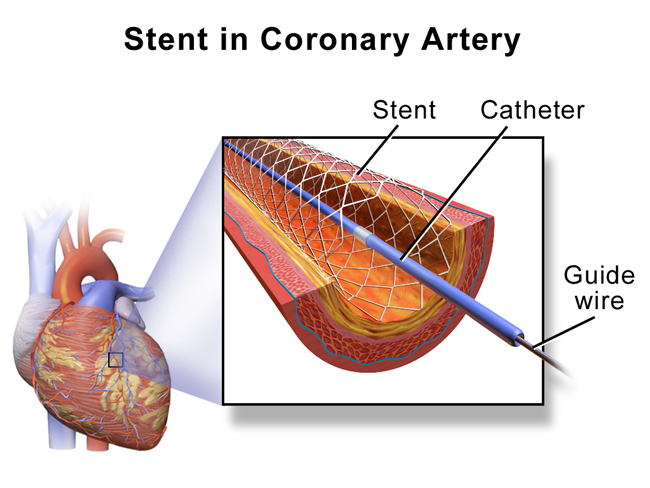Be proactive about stents!
10 years ago | Heart health
By pH health care professionals
There are many people, mostly over the age of 50, walking around with foreign objects in their chests. These objects are called stents, and they have been reported to be lifesavers to innumerable people with coronary artery disease.
So what are stents good for?
When someone is rushed to the hospital with a heart attack, the usual protocol is to get him or her to see a cardiologist in the “cath lab” as soon as possible. A catheter is inserted into the patient’s femoral artery and tunneled up to the heart, where it leaves a stent behind. The stent props the artery open, getting the blood flowing again. Often, the stent is made of stainless steel, though other materials can be used.
In the past, even people who didn’t have a heart attack, but who did have partial heart blockages (i.e. coronary artery disease), would get stents. But recent medical literature questions whether everyone with heart disease needs a stent.
Lifestyle changes and medication may be just as effective as stents
A 2012 study found that heart disease patients who got simple medical therapy (i.e. lifestyle changes and pills like statins) instead of stents did just as well in the end. While this finding may be surprising, doctors may need further proof before changing their tune.
The official guidelines from the American College of Cardiology haven’t endorsed this position, likely due to a study mentioned in the 2014 guidelines that showed that stents were better for preventing bad outcomes when there was a blockage in a certain critical area of the heart. However, the ACC reported that a new study is enrolling patients who will be randomized to either a stent or medical therapy, so the new data should help to bolster or refute the 2012 study.
For now, Julian M. Aroesty, M.D., an associate professor at Harvard Medical School, recommends that stents go to people who are still having chest pain despite medicines to relax the blood vessels, or to patients who just don’t want to be at risk of running to the hospital in the middle of the night to get an emergency stent.
Harlan Krumholz, M.D., M.S., a cardiologist and professor of medicine at Yale, says the 2012 study provides a valuable lesson to doctors and patients. “When people are making decisions, it’s important to disclose to them that this procedure – outside of an emergency – is not known to be lifesaving or to prevent heart attacks,” he said. “The vast majority of people who have this procedure have the expectation that it will help them to live longer. That belief is out of alignment with the evidence.”
Be proactive
If you are being advised to get a stent, ask your doctor why just medications and lifestyle changes won’t work for you, and bring along a copy of the study. Not every patient is the same, and your doctor probably has a good reason to recommend an invasive procedure. It’s your heart, so take it seriously!
Enjoy Your Healthy Life!
The pH professional health care team includes recognized experts from a variety of health care and related disciplines, including physicians, attorneys, nutritionists, nurses and certified fitness instructors. This team also includes the members of the pH Medical Advisory Board, which constantly monitors all pH programs, products and services. To learn more about the pH Medical Advisory Board, click here.



